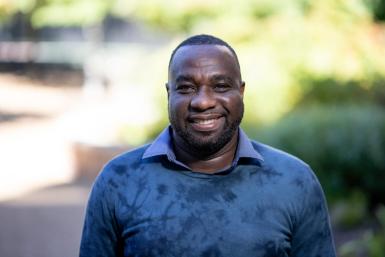George-Levi Gayle, John H. Biggs Distinguished Professor of Economics at Washington University St. Louis, and 2004 PhD Alumnus
In 2004 George-Levi Gayle graduated from our PhD program and became Assistant Professor of Economics at Carnegie Mellon University, Tepper School of Business. As of 2022, he is the John H. Biggs Distinguished Professor of Economics at Washington University St. Louis, a great career accomplishment.

Q. How did you decide you want to study economics?
I had a very good teacher when I was an undergraduate. I was preparing to do law specializing in accounting, but the dean said I had better grades in Econ.
Q. How would you explain your research to people outside of your field?
I try to understand why disparities exist: why some people are paid more than others; why some people persistently make less than others; and what are the causes of these? I normally look for causes that have to do with failures of ‘the law of one price’ (the idea that, in the absence of frictions, identical goods sold in different locations must have the same price) and the information frictions that cause these failures.
Q. Which of your research projects are you most proud of?
The paper I’m most pleased with is my 2012 paper on the gender wage gap. Other people have tried explaining the gender wage gap and it hasn’t worked out. Seeing how this research came together the way it did, and the literature it spawned afterwards, it is always one of the first papers discussed. To put all the theory and estimation together for the first time, was kind of my crowning glory.
Q. What is your biggest piece of advice for current graduate students?
My biggest piece of advice is to take courses outside of Econ. The things that I found most useful are the math courses, computational courses, and the statistics courses I took in the math and statistics departments at Pitt. Don’t stick to just Econ. Secondly, relish the repetitiveness of research. Just be patient with that. For every good paper that is out there, there are fifty attempts that didn’t succeed.
Q. What unique opportunities do you feel Pitt’s PhD program was able to offer you?
As my Pitt PhD advisor, Jean-François Richard, said “We may not be able to produce the best theorists. We may not be able to produce the best empirical person. We may not be able to produce to produce the best econometrician. But what we can do, is produce the most well-rounded person.”
Q. What are some of your favorite things about the city of Pittsburgh?
There is a hard-nose and underdog mentality that I relished. There was a dogged determination. I really liked that about the city. It permeated to the rest of the city, just like Primanti’s sandwich or its pierogies, to all the different neighborhoods. There’s always a different fight to do something new.
Interview by Gregory Scala, PhD student
